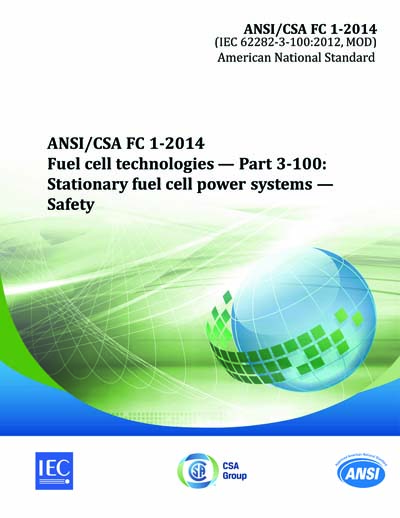Historical
CSA ANSI/CSA FC 1-2014 (R2018)
Fuel cell technologies - Part 3-100: Stationary fuel cell power systems - Safety (Adopted IEC 62282-3-100:12, first edition, 2012-02 with U.S. deviations)
Preface This is the first edition of ANSI/CSA FC-1:2014, Fuel cell technologies - Part 3-100: Stationary fuel cell power systems - Safety, which is an adoption with U.S. deviations of the identically titled IEC (International Electrotechnical Commission) Standard 62282-3-100 (first edition, 2012-02). It supersedes the previous edition of ANSI FC-1 published in 2012. The U.S. deviations are intended to a) correct inaccuracies; b) replace references to IEC Standards with references to U.S. and CSA Standards, where applicable. Scope This part of IEC 62282 applies to stationary packaged, self-contained fuel cell power systems or fuel cell power systems comprised of factory matched packages of integrated systems which generate electricity through electrochemical reactions. This standard applies to systems - intended for electrical connection to mains direct, or with a transfer switch, or to a standalone power distribution system; - intended to provide AC or DC power; - with or without the ability to recover useful heat; - intended for operation on the following input fuels a) natural gas and other methane rich gases derived from renewable (biomass) or fossil fuel sources, for example, landfill gas, digester gas, coal mine gas; b) fuels derived from oil refining, for example, diesel, gasoline, kerosene, liquefied petroleum gases such as propane and butane; c) alcohols, esters, ethers, aldehydes, ketones, Fischer-Tropsch liquids and other suitable hydrogen-rich organic compounds derived from renewable (biomass) or fossil fuel sources, for example, methanol, ethanol, di-methyl ether, biodiesel; d) hydrogen, gaseous mixtures containing hydrogen gas, for example, synthesis gas, town gas. This standard does not cover: - micro fuel cell power systems; - portable fuel cell power systems; - propulsion fuel cell power systems. NOTE For special application such as ""marine auxiliary power"", additional requirements may be given by the relevant marine ship register standard. This standard is applicable to stationary fuel cell power systems intended for indoor and outdoor commercial, industrial and residential use in non-hazardous (unclassified) areas. This standard contemplates all significant hazards, hazardous situations and events, with the exception of those associated with environmental compatibility (installation conditions), relevant to fuel cell power systems, when they are used as intended and under the conditions foreseen by the manufacturer. This standard deals with conditions that can yield hazards on the one hand to persons, and on the other to damage outside the fuel cell system only. Protection against damage to the fuel cell system internals is not addressed in this standard, provided it does not lead to hazards outside the fuel cell system. The requirements of this standard are not intended to constrain innovation. When considering fuels, materials, designs or constructions not specifically dealt with in this standard, these alternatives shall be evaluated as to their ability to yield levels of safety and performance equivalent to those prescribed by this standard.
Content Provider
CSA America, Inc. [csa]






